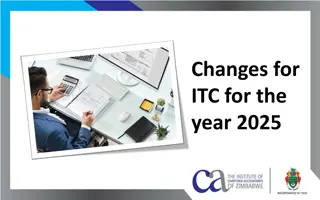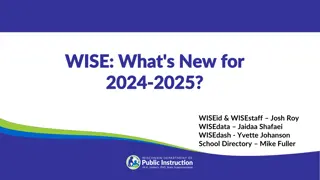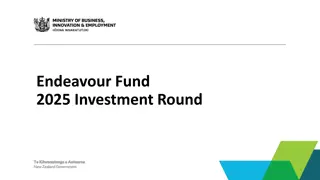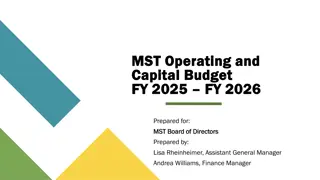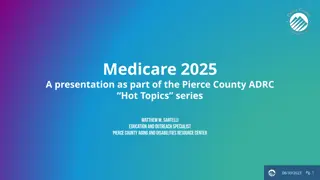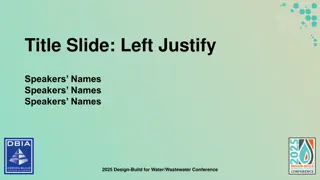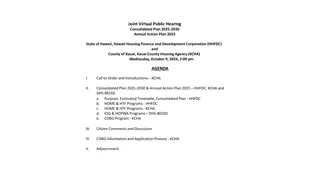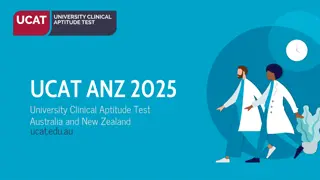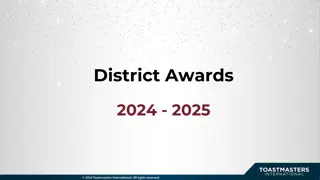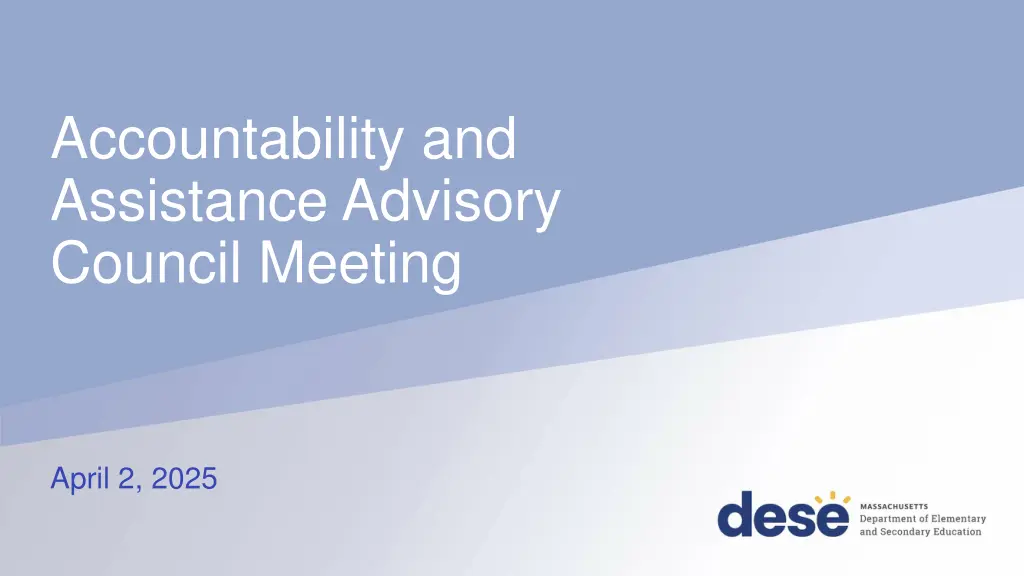
Accountability and Assistance Council Meeting Highlights April 2, 2025
Join the Accountability and Assistance Advisory Council meeting on April 2, 2025, for discussions on District Instructional Prioritization, DESE Draft Regulations feedback, and more. Explore the event agenda, introductions, norms, and the council's charge for the upcoming year. Stay informed about the latest updates in school and district accountability in the Commonwealth.
Download Presentation

Please find below an Image/Link to download the presentation.
The content on the website is provided AS IS for your information and personal use only. It may not be sold, licensed, or shared on other websites without obtaining consent from the author. If you encounter any issues during the download, it is possible that the publisher has removed the file from their server.
You are allowed to download the files provided on this website for personal or commercial use, subject to the condition that they are used lawfully. All files are the property of their respective owners.
The content on the website is provided AS IS for your information and personal use only. It may not be sold, licensed, or shared on other websites without obtaining consent from the author.
E N D
Presentation Transcript
Accountability and Assistance Advisory Council Meeting April 2, 2025 1
Agenda Welcome, Introductions, and Review of Norms District Instructional Prioritization Plan Guidance and the Integration of the District Standards and Indicators 2025 Accountability Reporting Feedback on DESE s Draft Regulations Related to the Competency Determination (CD) and Considerations for Future Accountability Reporting Next Steps and Closing 2
Welcome and Introductions Introductions: Council Co-Chairs: Heidi Driscoll & Barish Icin New member: Dr. Dianne Kelly (MASS) BESE Liaison: Dr. Marty West Returning Council members DESE staff 3
Thank You! Heidi Driscoll has served on the Council since 2019 (Co-Chair since 2022) 4
Discussion Norms and Meeting Protocols Promote risk-taking by not assigning specific comments to individual members in meeting summaries & minutes. Maintain respect before, during, & after meetings. Seek clarification & check understanding to avoid mistakenly attributing ideas to an individual or organization represented on the council. Keep improvements in student learning at the core of the discussions. Students should drive the conversation. Stay engaged in the issues. Actively address implicit biases & instill cultural proficiency in discussions. Encourage discussion from all voices of members. Be additive, not repetitive. Let members know if pre-reading or other pre-meeting assignments require more than 30 minutes of preparation time. Make it fun! 5
AAAC Charge for SY24-25 The School and District Accountability and Assistance Advisory Council (AAAC) advises the Commissioner of Elementary and Secondary Education on matters pertinent to the development of school and district accountability in the Commonwealth. To accomplish that goal, the Council will: Continue to advise the Department and the Board of Elementary and Secondary Education on the implementation of the currently approved district and school accountability and assistance system. Provide input and feedback on potential changes to the district and school accountability system, ensuring that the system produces high-quality, objective, and unbiased information that allows the Department, districts, and schools to partner together to advance the Department s Educational Vision and Strategic Objectives. 6
District Instructional Prioritization Plan Guidance and the Integration of the District Standards and Indicators 7 7
FY26 District Instructional Prioritization Plan One district plan vs. separate plans for each school identified as requiring assistance Alignment to key DESE priorities: Educational Vision, SOA Plans, Accountability targets NEW: Alignment to District Standards and Indicators Instructional Priority is the focus of support from the Statewide System of Support (SSoS) 8
District Instructional Prioritization Plan Sections of SSoS Guidance Intro: HQIM Status 1. Instructional Priority 2. Analysis of Strengths and Challenges 3. Stakeholder Engagement 4. Outcomes 5. Role Clarity 6. Monitoring Implementation 7. Resources 8. Targeted Support for Priority Schools 9
Cycle of Continuous Improvement #1 In the spring, districts identify an instructional priority, anchored in culturally and linguistically responsive, grade appropriate instruction Prioritize District develops a plan, based on the District Instructional Prioritization Plan guidance that outlines roles, key actions, and benchmarks to achieve the priority Plan is differentiated for schools that require assistance Plan includes supporting instructional systems and structures and skillful implementation of high-quality instructional materials. #2 Create a Plan #3 Track implementation of the selected strategies and supports Monitor changes in adult practice and student learning outcomes Troubleshoot challenges and adjust the plan as needed Track Progress 10
Plans for 2025 Reporting 2025 accountability reporting will remain unchanged from 2024: No additional years of data included Results based on 3 years of data (2023, 2024, 2025) Same weighting of years (15%, 25%, 60%) No changes to indicators or weightings Grade 8 Civics MCAS results not included Chronic absenteeism rates reflect missing 10% or more of the school year No changes to participation rate requirements Districts and schools are expected to maintain rates of 95% or higher New Competency Determination (CD) law does not affect graduation rates used in 2025 results System uses the 2024 four-year and 2023 five-year rates Same general timeframe for reporting Results available in late summer/fall 12
Accountability System Review Accountability System Review Advisory Committee Report September 2024 Accountability System Review Advisory Committee Report released, including recommendations for potential changes to the accountability system Winter Summer 2025 Internal discussions with DESE staff Late Fall 2025 BESE discussions Stakeholder engagement (including advisory councils) Winter Spring 2026 BESE discussions Public comment on proposed changes System approval (state and federal) Fall 2027 System implementation (results reported) Accountability System Review Advisory Committee Report Accountability System Review Advisory Committee Report Accountability System Review Advisory Committee Report Operationalizing System * Tentative timeline 13
Feedback on DESEs Draft Regulations Related to the Competency Determination (CD) and Considerations for Future Accountability Reporting 14 14
Background Information The "competency determination" shall be based on the academic standards and curriculum frameworks for tenth graders in the areas of mathematics, science and technology, history and social science, foreign languages, and English, and shall represent a determination that a particular student has demonstrated mastery of a common core of skills, competencies and knowledge in these areas, as measured by the assessment instruments described in section one I by satisfactorily completing coursework that has been certified by the student's district as showing mastery of the skills, competencies, and knowledge contained in the state academic standards and curriculum frameworks in the areas measured by the MCAS high school tests described in section one I administered in 2023, and in any additional areas determined by the board. 15
Background Information Since the passage of the ballot question, the Board has discussed the matter of the CD and the new statutory requirements. November, December, January, February regular meetings February special meeting The proposed amendments are informed by the Board s discussions and are designed to focus on student learning and promote academic equity for all students. 16
Overview of Proposed Changes to Regulations Align the regulations to the new statutory language. This includes the deletion of obsolete language. 17
Overview of Proposed Changes to Regulations Propose new definitions. Satisfactorily completing coursework shall mean a student earns full credit in accordance with the district s grading policy. Showing mastery shall mean a student successfully completes in accordance with the district s grading policy: (1) the final assessment for a course; or (2) a capstone or portfolio project; or (3) an equivalent measure identified in the district s Competency Determination policy. 18
Overview of Proposed Changes to Regulations Specify minimum requirements to earn the Competency Determination. Beginning with the graduating class of 2026: Student must show mastery in Math, ELA, and Science Student must satisfactorily complete coursework in two years of high school English language arts, Algebra I and Geometry or Integrated Math I and Integrated Math II courses, and one year of Biology, Physics, Chemistry, or Technology or Engineering 19
Overview of Proposed Changes to Regulations Add United States History as an additional area determined by the Board." Beginning with the graduating class of 2027: Student must show mastery and satisfactorily complete coursework in Math, ELA, and Science, and Student must show mastery in United States history and satisfactorily complete coursework in a one-year United States history course. 20
Overview of Proposed Changes to Regulations Offer options to address students needs. In the limited circumstancewhere a district is unable to document a student s prior coursework, a student may earn the Competency Determination by: (i) attaining a qualifying score of at least Meeting Expectations or Exceeding Expectations achievement levels on the relevant high school MCAS assessment; or (ii) meeting the standard for a substituted equivalent that the district certifies satisfies the same academic standards. 21
Overview of Proposed Changes to Regulations Provide oversight. Each district shall adopt a Competency Determination policy. The policy shall: Be approved by the governing body Include an appeal process Be posted publicly and translated Be submitted to the Department along with the district s local graduation requirements Allow for audit. The Department shall implement a system to audit the quality of districts Competency Determination policies. 22
Possible Non-Regulatory Steps Public posting of both district CD policies and local graduation requirements DESE does not have a comprehensive database of local graduation requirements Public reporting of performance in school courses in relation to other outcome measures Would provide information to the public about how grading aligns with other outcome measures Include review of local graduation policies in DESE s district review process 23
Follow-Up Discussion from February 10th Special BESE Meeting Whether to use MCAS more broadly as a path to show mastery and satisfactorily complete coursework to earn the Competency Determination. 24
Public Comment Period Public comment may be submitted via an online form, or sent via email to Competency.Determination@mass.gov, or sent via mail to Regulations Public Comment, c/o Commissioner s Office, Department of Elementary and Secondary Education, 135 Santilli Highway, Everett, MA 02149. The deadline for the public comment period is April 4, 2025 at 5:00pm. The Board is expected to vote on the proposed amendments at its regular monthly meeting scheduled for May 20, 2025. 25
Discussion 1. General comments and/or comments specific to the following sections of the proposed regulations: Definitions (30.02) Standards for Competency Determination (30.03) District Certification (30.04) Audit (30.05) In addition to the pathway proposed in the amendments to the regulations, the Department of Elementary and Secondary Education is seeking public comment on the question of whether to include a second, alternate pathway for earning the competency determination. The second pathway would be an additional route available to all students. It would be based on earning a qualifying score on the relevant high school MCAS assessment, which high school students are required to take. Given the federal requirement to include graduation rates in the accountability system, what considerations should be given to this measure as we continue our work to review and potentially revise the existing system? 2. 3. 26
Next Steps and Closing 27 27
Looking Ahead Upcoming meetings: May 14 June 4 Looking for nominations for another Council Co-Chair 28

